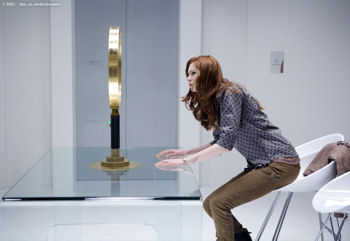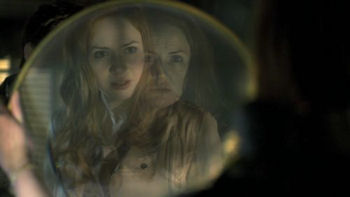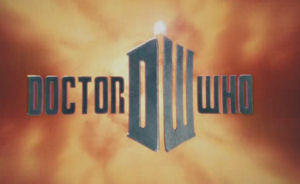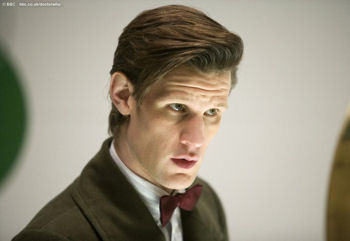We rarely see the Eleventh Doctor on planets other than Earth. In the televised adventures, he’s set foot on alien soil (as opposed to ships or space stations) only three times: “The Time of the Angels,” “A Christmas Carol,” and “The Doctor’s Wife.”
Only one of those worlds was what you’d call populated, and that was by humans. We haven’t yet seen him step out onto an alien planet bustling with life and experience its culture before getting himself into trouble. He’s much more concerned with Time than Space.
Since this show has historically been the other way round, we can’t really complain, but if his universe sometimes feels a little lonely, maybe that’s why. “The Girl Who Waited,” set on the fourth alien planet for this Doctor, is all about loneliness: how much you can take, what it does to you, what it drives you to do.
The planet’s name sounds like “Applappachia,” suggesting a place where hillbillies might buy iPads. It’s far more “Apple” than “Appalachia,” though: clinical, antiseptic white and metallic gray with bright iconic buttons. Turns out they’ve come to a vacation resort at a time of plague (“why don’t you look at a history book?” asks Rory. “That’s not how I travel,” replies the Doctor), and the planet’s collection of art, cinema, and horticulture has become the compensating comfort in the ultimate terminal patient ward.
 |
Amy immediately gets herself committed, through simple user error that probably wouldn’t have occurred if they’d entered through the front door with an escort rather than landing the TARDIS right in the middle of the place. We learn that the plague (which Amy can’t get, because she only has one heart, but the robots running the place don’t expect aliens so they don’t realize this) kills in one day, but time is compressed on the patients’ side of the facility, so that they can live out an entire lifetime in what is for their loved ones, watching through a time window, only a day.
I didn’t quite get why each patient was kept in a separate timestream, so that they’d never be able to make friends with other patients and enjoy their company, at least. And I never got why, if the compression allows the patient to live an entire lifespan without dying from the disease, it couldn’t be mapped to the same amount of time for the loved ones on the other side, so that everyone would grow old at the same rate. But maybe this way you know that the people you really want to see are always on the other side of the glass whenever you want to come and see them, and you never have to wait for them to visit.
Except when you do. Say, thirty-six years or so. The Doctor’s steering is off, and in a place like this, off by a little means off by a lot. So by the time Rory catches up to his wife, she could be his mother. His mother in improvised samurai armor, wielding a katana, beheading medical robots who just want to do her the “kindness” of injecting her with medicines inimical to her alien biology, and really REALLY pissed off at being left alone for longer than she’d previously been alive. And when it becomes clear that saving Amy in the past means that Amy in the future will be annihilated, everyone has some hard choices to make.
 |
It’s a little hard to fully grasp the emotional impact of this on Amy. From our point of view, she’s saving herself in the past and undoing her own imprisonment. From hers, though, she’s waited over three decades, gradually losing hope that anyone will come to find her, becoming resigned to her abandonment, and fighting desperately every day to survive against a relentless onslaught of innocently murderous robots…and all this work so that she can essentially be cloned and send her clone with the people she loves while she herself effectively dies. It’s for her own good, but either way, the Amy pushing sixty suffers crushing loss.
Overall it’s a very effective episode, apart from a few small complaints (why is the facility so unforgiving of error? how did Amy come to care so deeply about the fabric of time? and was it necessary to use quite so much slo-mo at the end there?). They skimp on the makeup in the long shots, but Karen Gillan does a fine enough job playing her older self that it hardly matters.
Despite being as much on the sidelines in this episode as Amy and Rory were in the last, the Doctor has some subtle devastating moments, demonstrating again that he can’t always be trusted, and he’s all the more interesting for it.
Personally I’m getting close to burned out on Amy and Rory’s simple absolute devotion to each other, which is such a given at this point that even old Amy’s fury seems more like a sulky tiff than a serious threat to their union. They’ll always wait for each other, and save each other, and think of no one but each other, and that’s beautiful, but we get it now, I think.
Also, I really think one non-Dickens-related inhabited alien world in two years would not kill us, but unless it’s showing up in the finale, I doubt we’re getting one. But taken in isolation, on its own terms, this really works.
Small things of note:
- "Sometimes knowing your own future is what enables you to change it." Does this episode remind you of someone else who has a deadly future they might need to try and change? Perhaps even two someone elses?
- The Doctor has a good memory for 21st century social networking services.
- Mom's as handy with a sword as her daughter is with a gun.
- "Hello, handsome man!"









